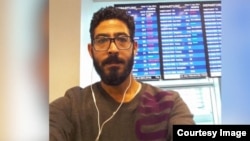A Syrian asylum seeker who says he's been stranded at a Malaysia airport for more than a month — after his attempts to leave the country were repeatedly blocked — has been contacted by the United Nations.
Hassan al-Kontar, who ended up in Kuala Lumpur after fleeing a war in Syria is stuck in limbo — neither able to stay nor seek a new home.
An airport immigration official tells VOA that responsibility for Kontar, who is seeking refuge elsewhere because his Malaysian visa expired and the country won't grant him asylum, lies with a private airline that brought him into the country, not the government.
Kontar said U.N. High Commission on Refugee officials met with him on Wednesday after video pleas that he posted to social media drew media attention.
"I tried to reach each and every international human [rights] organization," he said on Wednesday. "Today itself they show up, after 36 days, they interviewed me, I just finished with them from 9am to 2pm."
From Kontar Twitter Feed:
Two UNHCR officials told Kontar his case is being reviewed, but made no promises, according to Kontar.
In a statement, a UNHCR spokesperson confirmed it had contacted Kontar and authorities, but was unable to comment on individual cases.
"In general, it is standard practice to advocate for the protection of persons in need of international protection," the statement said.
Kontar said that after fleeing Syria in 2006 he was unable to renew his residency visa in the United Arab Emirates and consequently was arrested and deported to Malaysia in 2016.
Realizing his case was equally hopeless in Malaysia, he tried to fly to Ecuador on February 28, 2017, but was prevented at the last minute by Turkish airline officials because his flight had a stopover in Turkey. The ticket cost him thousands of dollars, he said.
With what little money he had left, Kontar bought a March 7 AirAsia ticket to Cambodia, a country he knew had a visa-on-arrival option that could serve as a bridging destination on his way to comparatively refugee-friendly Ecuador.
But upon arrival, Cambodian officials took his passport and demanded a hefty bribe, which he could not pay, said Kontar.
"They asked me how much cash I had," he said. "They were able to solve the matter if I gave them under the table some money, but they were asking for a lot so I refused to give them that money so they sent me back."
Kontar said his passport remained with AirAsia staff, who helped him with the odd meal along with other random people inside the arrival area.
Keo Vanthan, deputy director of Cambodia's Immigration Department, could not be reached for comment.
Keo Sarin, director of the Immigration Department's administration office, confirmed Kontar had arrived on March 7, but said he knew nothing about the case and had not seen a report into it before hanging up on a reporter.
On Thursday Sok Veasna, an official at the Immigration Department, told The Phnom Penh Post Cambodia had a right to turn away certain individuals.
"We have visa-on-arrival, [but that] does not mean we allow everyone to enter Cambodia without our security check or different layers," he told the paper in a message.
Cambodia is a signatory to the U.N. Refugee Convention and has also resettled at least one Syrian under a controversial refugee deal with Australia.
An immigration official at Kuala Lumpur International Airport 2 - where Kontar is stranded - declined to address the case.
"It's under Air Asia's responsibilities," the official said, and provided a number for the airline that would not connect.
In a void of information, Kontar remained in the airport's arrival area and said he feared he would be deported back to Syria imminently, something he had begged Malaysian immigration officials not to do.
"I said it would be like a death sentence. I cannot go to Syria," he said. "I explained to them why and I tried to enlighten them about international law and how you are not allowed to send people back to a conflict zone."
"It's the story of thousands of people who tried to smuggle themselves through the Mediterranean and watched their kids die. It's the story of the Syrians who are stuck inside Syria. It's not only my story, it's my people's story," he said, fighting back tears.




